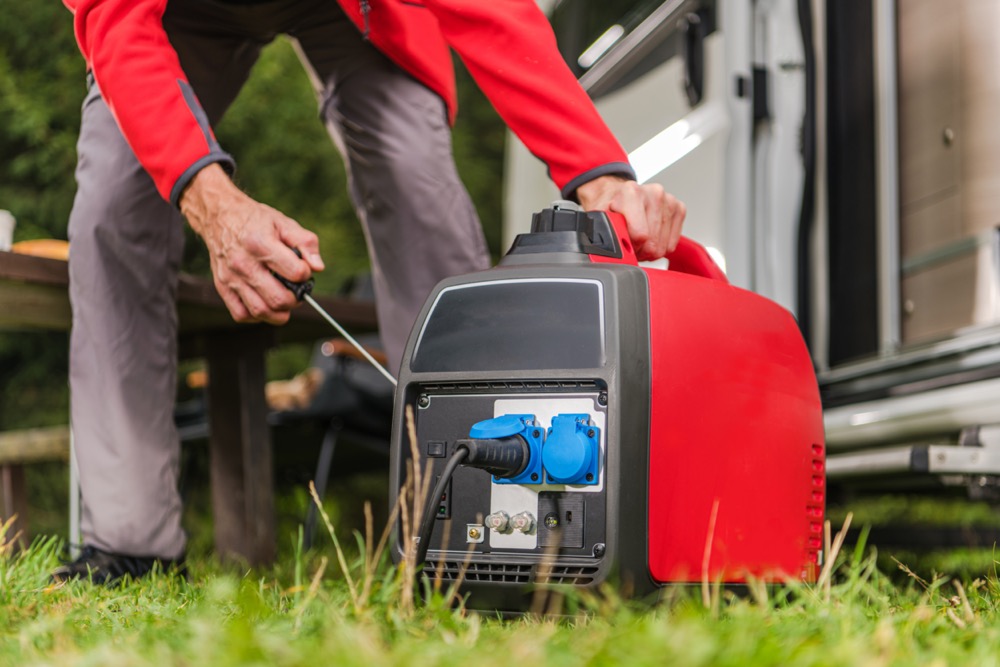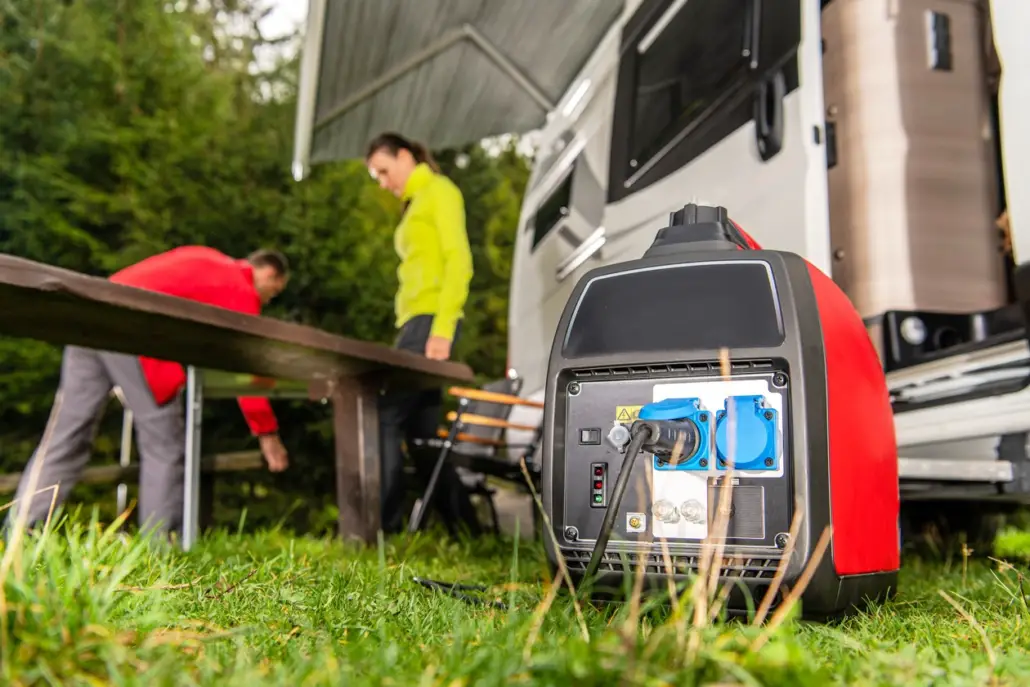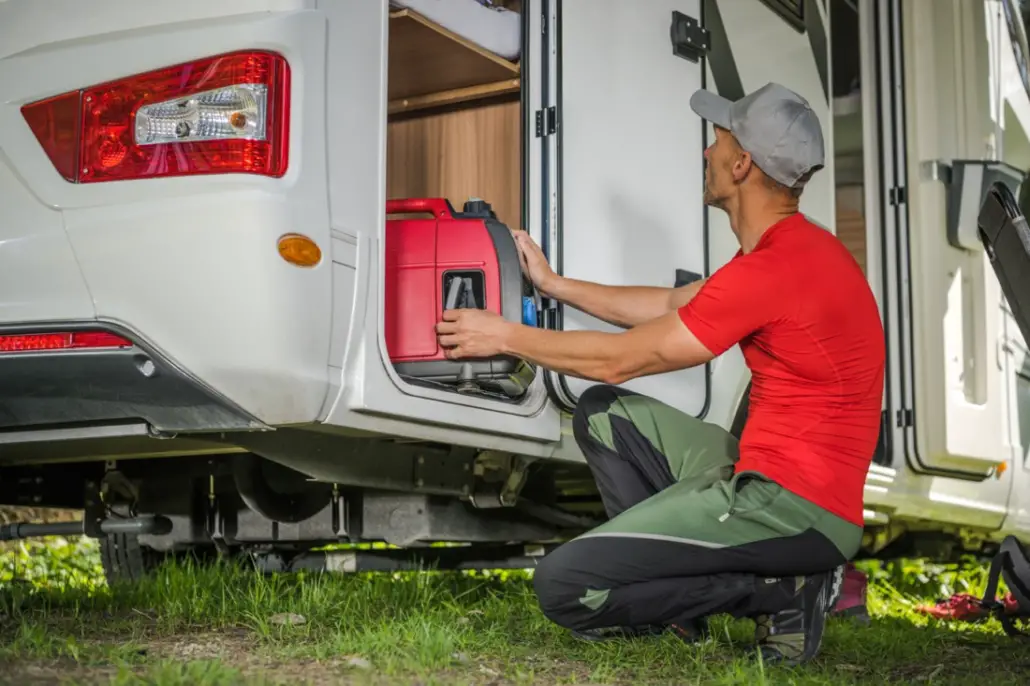Is an Inverter Generator Worth It – Buying Guide, How To Choose The Best One

Your day-to-day life depends so much on electricity. Can you even fathom not having any at home? Unfortunately, it’s a stark reality for many, even in first world countries.
Extreme weather conditions can damage the grid, cutting homes off from supply. Or perhaps you need a temporary power source for a fishing trip or a food truck as a new business?
This gives many uses for a generator, but it’s important to pick the right one. Without the right flow of electricity you could actually damage certain devices you plug into this type of power source. And this is exactly why inverter generators are so popular.
But is it worth getting one for your application? Use this guideline to obtain the necessary information to make an informed decision.
We cover it all and compare it to other generator types for an in-depth overview.
How Does an Inverter Generator Work?
This type of generator has a built-in inverter. Similar to other generators, an invertor generator produces power thanks to an alternator.
This power is multiphase AC power, with high voltage. Unlike a traditional generator, the invertor generator will then convert this flow of energy to DC power and then to AC power again. This is possible thanks to a microprocessor.
The result of this process is power that flows smoother and more stable, with consistency often matching that which you get from a building’s power outlets. The consistency will depend on the quality of your unit.
Why Are Inverter Generators So Popular?
Inverter generators are popular because they pose less risk to the user’s other assets.
Since the electricity delivery is more stable compared to some other generator types, there’s less chance of damage to items like mobile phones or other appliances it powers.
In addition, inverter generators can run more quietly and uses less fuel, which results in cost savings for users.
Inverter Generator vs Generator

You can determine your best option by shopping according to what you prioritize:
Capacity
A conventional generator trumps an invertor generator in terms of the power delivery. With higher output capacity you can power more or bigger items.
Noise
The attraction of an invertor generator is its quieter operation. You can use it in scenarios where noise would be a problem, such as a camping site or powering medical equipment in someone’s room.
Green living
It produces less carbon emissions than a traditional generator and they’re more fuel efficient and therefore reduces your carbon footprint.
Cost
Fuel efficiency makes an inverter type a more eco-friendly and budget friendly option. However, the initial capital investment of an inverter generator is bigger, because normal generators are cheaper.
Flow
You will enjoy the benefit of cleaner voltage and a more stable flow of electricity with an inverter generator.
Portability
Lastly, inverter generators are often smaller, making them more portable than traditional models.
Is An Inverter Generator Worth Buying?
The value an inverter generator has for you will depend on your priorities. It’s worth the larger capital investment if you need a quieter, more stable power source.
If you do need a little more power than what one unit can deliver, you often have the option of connecting two inverter generators to produce double the power.
An inverter generator is especially valuable if you’re powering sensitive tech devices. For example, telecommunications appliances are sensitive in terms of the power quality that flows into them.
It’s worth the additional cost if you know you’ll prevent unnecessary damage or malfunctioning of a device.
Things To Consider When Buying An Inverter Generator

To make the best investment when buying your generator, consider the following features and specs.
Power
Before buying a generator you must know how much power you need. Make a list of all the devices, appliances and other items you will connect to the generator.
From the 10W of your mobile phone to the 600W a refrigerator may require, do the math so you know the general output you’ll require.
Shop for a generator that can accommodate you, or see if connecting two inverter generators will be sufficient if one isn’t enough.
Size
Measure the space you have available for your generator, whether it’s to transport it in the back of your car for a trip or place it on a level surface at home for when the power grid goes down.
Ideally there should be space for ventilation around the unit too. Now make sure you buy an item that suits those measurements.
Also consider the weight, especially if you will carry it by yourself most of the time.
Effectiveness
In any electric motor, there is some power loss in the form of by products like CO2 gas, noise and heat.
This means a 1000 watts generator may in reality only deliver 800 or 900 watts. The more efficient the generator, the more watts you will have available, giving you more value for money.
Quality units are 95% efficient or even more, so research reviews and specs to compare before you buy.
Noise
In some scenarios, noise is an important factor, such as environments where you don’t want to disturb people—think bedrooms and camp sites.
Compare the dB ratings of different inverter generators to find the best. However, it may be less important if you’re buying for use during noisy outside events.
So, if this isn’t a dealbreaker where you’ll use your generator, rather prioritize other features.
Cost
You must buy according to what your budget allows, but remember to consider all relevant costs:
- Immediate capital investment
- Maintenance
- Continuous fuel expenses
Calculate what your expenses will be over a long period. The savings on fuel can make up for buying a more expensive unit.
Inverter Generator Pros

Less Noise
The mechanism in an inverter generator runs quitter than traditional units. This is thanks to features like sound attenuating enclosures, of which the engineering results in sound levels as low as 50dB.
More Power Stability
There are fewer fluctuations in the power an inverter generator delivers. It more closely simulates the power your home receives from the grid.
The stable flow means less risk of damage to connected devices.
Portable Design
The majority of inverter generators are small compared to some other types. They are designed with portability in mind so you’ll find them easier to carry, or transport in your vehicle.
Fuel Efficient
Inverter generators can adjust their speed according to the power load required. When you need less, it will adjust the speed and this means less fuel wastage.
Low Emissions
The process it uses and thanks to adjusting the speed according to load requirement, also results in less emissions.
You can become more environmentally friendly by switching from a traditional generator to an inverter generator.
Inverter Generator Cons
Expensive Generator Type
Because of the advanced technology, these inverters cost more than traditional units.
Lower Output
Although they deliver stable power, they aren’t as powerful as traditional generators. You can connect two units if you require more power though.
Inverter Generator vs Solar Generator
| Inverter Generator | Solar Generator | |
| Noise | Runs quiet | No noise |
| Cost | Expensive but more fuel efficient than some regular generators | Can be more expensive than an inverter generator, but no fuel expenses |
| Power output | Stable power source | Depends on sun |
| Space and dimensions | Designed to be portable | Needs lots of space for solar panels |
Opt for an inverter generator if you want a more portable option and you don’t have the budget for solar types.
To go the extra mile in living green and if you don’t want any noise at all, solar generators are best.
Inverter Generator vs Gas Generator
| Inverter Generator | Gas Generator | |
| Noise | Runs quiet | Noisy |
| Cost | Expensive | Budget friendly |
| Power output | Stable power source | Varying electrical signal |
| Space and dimensions | Portable | Large units |
Tips for Running an Inverter Generator
How well you look after your generator will affect its functionality. Tips on maintenance of generators and other handy advice include:
- Cover your generator when not in use to prevent dust and debris from settling on it and contaminating the interior.
- Always empty the fuel tank once you’re finished using it, to prevent gum deposits forming inside.
- Always have fuel and oil on hand, so you’re not caught off guard by an empty tank.
- For safety, wait 15 minutes and let the unit cool down before adding more fuel.
- Place it on a level surface to prevent certain components running dry.
- Don’t use cords longer than 100ft, or you risk burnout of motors or compressors.
Best, Reliable Brands of Inverter Generators in 2022
There are many trustworthy brands, but most Top 10 lists will include models from these brands:
- Honda
- WEN
- Champion
Inverter Generator FAQS

Q: Can in inverter generator be used indoors?
You can’t use fuel powered generators inside a building. These generators produce fumes which can kill people if they inhale them.
Also don’t position it close to doors or windows, because the fumes may easily drift inside. There must be adequate ventilation and even partly enclosed spaces still carry risk. Only use it out in the open.
Q: How to start an inverter generator
Starting a generator does depend on the type of unit you have. Some generators have recoil ropes which you need to pull. A more user-friendly option is having an electric start model which will only require pushing a button.
Before you start your inverter generator, make sure all fuel and oil levels are appropriate, so you don’t damage it by running it dry.
Q: Can an inverter generator power a house?
Yes, if you invest in a quality unit using the latest technology, an inverter generator can power a house. You may have to run it in parallel mode to another one in order to generate enough electricity.
The benefit is the stability of the current, which is similar to the power you draw from the grid. This is safer to use than a traditional generator, carrying less risk of damaging sensitive devices.
Q: How do I calculate what size generator I need?
Determine the amount of power you need by adding the required power of all the devices you want to power. For an accurate calculation, list all devices and write down both the starting and running wattage of each one. Now add it together.
You can also use online power calculators. The most accurate method is to ask an electrician to do an on-site visit and provide you with exactly the right calculation.
Q: How much kVA is required for a small house?
Normally, for a standard house you need a 5 kVA to a 7.5 kVA generator to run basic appliances. This includes lights as well as larger appliances like your refrigerator.
Check the ratings on your water heater to ensure it won’t draw too much for this setup.
Q: What can a 7.5 kVA generator run?
The exact list of appliances and devices you can run with a 7.5kVA generator depends on the specs of the powered equipment.
However, in most cases you can run your lights, simple gadgets and appliances, the TV, the microwave oven, a refrigerator and perhaps even the AC.
Q: Can you leave an inverter generator in the rain?
It is not safe for generators to get wet and be used in moist or rainy conditions. You can opt to cover it, but it needs adequate circulation to work optimally and safely. So, rather store it in a safe, dry and secure area when it rains and only move it into the open in good weather.
Also read manufacturer instructions in detail, to ensure safe operation. Brands will usually provide guidelines regarding usage of portable generators during rainy conditions.
Conclusion

Thanks to advances in technology, households and businesses have much better options than a few years ago—and this goes for generators too.
Use our guidelines on inverter generators to find a model that will safeguard your sensitive appliances, while also minimizing your carbon footprint and making less noise.
What’s not to love?
If you have more questions on this topic, please leave a message in our comments section.


